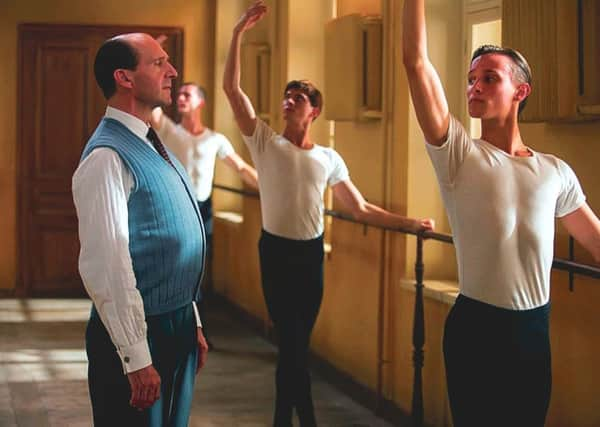Ralph Fiennes on his reluctance over own film The White Crow


Through two previous projects, Coriolanus and The Invisible Woman, the actor, 56, discovered just how difficult it is to do both at the same time.
But, when it came to making The White Crow – a biopic which depicts the decision dancer Rudolf Nureyev made to defect from the Soviet Union in 1961 – he changed his mind.
Advertisement
Hide AdAdvertisement
Hide Ad“In all the madness and stress of trying to raise the money, it was only when I was confronted by quite an assertive Russian executive producer who said, ‘Why are you not in the film, Ralph? People would be interested in investing if you were in it’, that I caved,” admits Fiennes.
“But I’m the anomaly a bit, because I wanted to have Russian actors in Russian roles speaking Russian.”
However, the star, who first found fame working with the Royal Shakespeare Company, does speak Russian in the film, as he plays Nureyev’s inspirational ballet teacher, Alexander Pushkin, who took Nureyev under his wing, and into his and his wife’s home.
The story sees a 22-year-old Nureyev travel to Paris as a member of of the world-renowned Kirov Ballet company. He’s eager to consume all the culture, art and music the dazzling city has to offer, but KGB officers are watching his every move, and become increasingly suspicious of his behaviour.
This leads to a nail-biting confrontation at Le Bourget airport, during which Nureyev is forced to make a heartbreaking decision about the future, knowing it may change the course of his life forever, and could put his family and friends in danger.
Also woven through the film are flashbacks to his poverty-stricken childhood in the Soviet city of Ufa – and it’s all based on a biography of the dancer, written by Julie Kavanagh.
Fiennes first read the book almost 20 years ago.
“It impacted me because this is a story of a young performer,” says the actor, known for films such as The Grand Budapest Hotel, Schindler’s List, as well as the Harry Potter series.
“Because he goes in front of an audience and that’s what I do too, there’s a little seed there of something in common.”
Advertisement
Hide AdAdvertisement
Hide AdFurthermore, he was incredibly moved by how, as a young boy who had limited educational resource, Nureyev discovered “this ferocious desire to express himself as a dancer, at the expense of almost everything else, and finally, the expense of living in his homeland”.
The star who plays Nureyev – Ukrainian Oleg Ivenko, a dancer from the Tartar State Ballet company – had actually never acted before.
Fiennes worked intensively with him throughout the filming process, and the result is a captivating screen debut.
“I pushed him to understand the best screen acting is rooted in being really present and in the moment,” explains the director.
“You’re reacting and listening, so the thing to get him to feel is, ‘Don’t show me you’re angry or shy or irritated or whatever; just feel it, be it. Have it inside’. If you really have it or are close to having it, it will reveal itself.”
When it came to the challenges of making The White Crow, both Fiennes and the film’s writer, David Hare, were keen to avoid using clichés, as they depicted this period in history.
“Clearly it’s a time that’s been well trodden by film; [a] Cold War drama really is what, in one sense, it is,” notes Fiennes.
“[It was] very important for me that we tried to show our audience that there was a world in Soviet Russia which nurtured this young boy, which gave him a fantastic ballet education and indeed would welcome him.
Advertisement
Hide AdAdvertisement
Hide Ad“In Leningrad, we saw him be not only taken into the home of his teacher and his wife, but also being accepted into a group of young Leningrad students, and this was a welcoming and hospitable place.”
The KGB officer named Strizhevsky was, in particular, a character he wanted to make sure he got right.
In one scene in Paris, we see him say to The Kirov: “Make sure that Nureyev behaves according to these ideological standards.”
But Fiennes was keen to show that this man was a human being who had a job to do.
“I wanted him to be a complex character; he’s played by a wonderful Russian actor, Aleksey Morozov, who does a brilliantly, highly interesting complicated man, [who] puts pressure on himself, likes Rudolf, sees he’s very talented, tries to pressure him to behave without too much aggression, and finally gets hardcore when the chips are down at the end.
“But that character was crucial, in that he would have been an educated, alert-minded man, who’s not a thug, not a bully, and I tried to clear away preconceptions about that sort of behaviour.”
The White Crow is in cinemas now